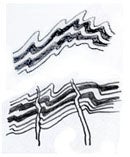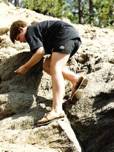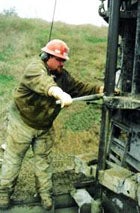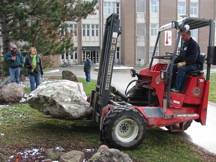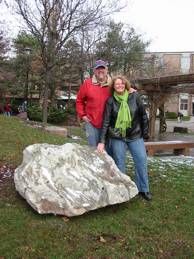Deep
under
a
mountain
range
I
was
a
part
of
a
great
mass
of
granite.
I
started
my
second
rock
cycle
as
molten
magma,
which
gradually
cooled
over
millions
of
years.
When
the
mountains
of
which
I
was
part
of
were
eroded
by
wind
and
rain,
my
tiny
particles
became
mud
and
sand.
My
quartz
crystals
were
ground
down
and
formed
sand.
This
sand
was
just
like
the
sand
you
play
with
on
the
beach
in
the
summer.
The
other
minerals,
feldspar
and
mica
in
my
granite
were
ground
and
decomposed
into
fine
mud
and
clay.
These
materials
were
transported
from
the
north
west
of
Ontario
to
a
growing
river
delta.
A
great
wedge
of
sand,
gravel,
silt
and
clay
grew.
As
more
layers
were
deposited
on
the
top
of
my
eroded
material,
water
was
squeezed
out
of
the
mud
and
sand.
Over
time
sand
turned
to
sandstone
and
silt
and
clay
turned
into
siltstone
and
shale.
More
mud
was
added
to
the
pile
and
time
moved
on.
Two
continents
moved
together
pushing
thousands
of
metres
of
rock
into
a
stack
of
layers
10,000
metres
high
or
more.
Some
of
the
beds
were
flipped
upside
down
as
they
rode
over
each
other.
The
rocks
at
the
bottom
of
the
pile
including
the
remains
of
my
granite,
moved
ever
deeper
to
about
25
kilometres
below
the
mountains.
It
was
very
hot
down
there.
The
rocks
became
squishy,
and
moved
slowly.
The
layers
of
sandstone
and
shale
gradually
heated
up.
Shale
turned
to
slate
and
then
changed
to
sparkly
mica
flakes.
Sandstone
hardened
into
quartzite.
All
this
material
then
flowed
slowly
and
folded
without
melting.
Cracks
opened
up
in
the
rocks
and
the
mineral
quartz
crystallized
in
the
cracks.
Half
a
billion
years
of
erosion
washed
away
the
mountains
forming
other
rocks.
My
new
crystals
were
then
exposed
to
the
atmosphere
again.
I
saw
interesting
things
happening
for
500
million
years.
Living
things
moved
across
the
surface
of
the
Earth
and
flew
in
the
sky.
Ice
scrubbed
my
surface
a
few
thousand
years
ago,
during
the
Ice
Age.
Recently
humans
found
my
sparkles
irresistible,
cracking
out
lumps
of
my
rock
to
decorate
their
homes
and
gardens.
To
break
the
rocks
from
the
ground,
holes
are
drilled
into
me
using
a
drill
bit
covered
with
a
hard
mineral
called
diamond.
You
can
see
some
of
the
holes
in
Jesse’s
rock
drilled
so
my
rock
could
be
free
from
the
surrounding
ones
at
Red
Bridge,
near
North
Bay,
Ontario.
Jesse
found
rock
stories
exciting.
As
a
boy
he
used
to
collect
rocks
and
imagined
all
the
interesting
stories
they
could
tell.
When
Jesse
grew
up
his
interest
in
rocks
became
his
career.
He
worked
as
a
hydrogeological
technician
in
the
Department
of Earth
Science
at
the
University
of
Waterloo
then
later
became
an
environmental
driller
for
Geo-Environmental
Drilling
Company.
In
order
to
read
the
messages
in
the
rock,
Jesse
drilled
into
mud
and
sand
deposited
during
the
Ice
Age.
He
did
this
to
find
useful
things
for
people,
such
as
groundwater
and
sources
of
pollution,
which
needed
cleaning
up.
Jesse’s
rock
is
here
to
remind
you
that
we
all
have
a
life
cycle.
We
touch
other
people’s
lives
transforming
them
in
wonderful
ways
which
continue
when
we
let
go
of
the
material
forming
our
bodies.
This
material
continues
on
through
Planet
Earth’s
cycles
of
life,
water,
and
rock.
Given
enough
time
a
part
of
you
may
find
it’s
way
into
a
sparkly
mineral
like
diamond
or
mica.
What
an
adventure!
Rock
description
for
geologists
Gneiss
formed
from
sedimentary
rocks
during
the
Grenville
Orogeny,
1
billion
years
ago.
From
McLaren's
Bay
Mica
Stone
Quarries.
Red
Bridge,
near
North
Bay,
Ontario.
Jesse’s
rock
being
installed
in
the
University
of
Waterloo's
Rock
Garden.
Jesse's
parents
Bob
and
Marg with
the
rock
donated
in
memory
of
their
son
Jesse
who
died
in
a
tragic
work-related
accident
on
October
19,
2004.
In
Jesse’s
honour
always
remember
to
work
hard,
work
safe
and
work
happy!




